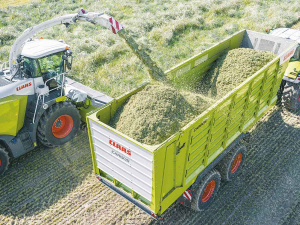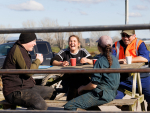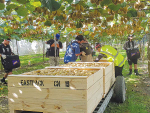The race is on to find sufficient qualified people to drive the array of agricultural machinery for this season’s harvest.
With New Zealand’s border closed at present, Rural Contractors NZ is working with government to see if it’s possible to allow some specialist workers into the country – as they have done in the past – to drive and maintain the equipment to sow and harvest crops during the spring and autumn.
One such rural contractor is John Austin, who runs a sizable contracting business at Te Awamutu in the Waikato.He employs about 38 full time staff, but also takes on another 30 staff during the peak of the season.
Austin told Rural News some of the extra people are locals, but the bulk of his casual staff come from places such as the USA, Germany, England and Ireland.
“Generally, they are people on working holiday visas, but we also get some who come back for up to four years running – because their skill set is so important to us,” he explains.
“They are mostly people with a farming background and some have up to 10 years’ experience driving and maintaining the machines we operate. Some of our machines are quite demanding to drive, and while we can train people, there is a point where experience becomes a factor.”
Austin fully supports programmes that are being put in place to train newcomers to the industry. However, he says the reality is that experience counts and there is a limit to how many newly trained staff he could actually take on.
Austin believes the most he could employ would be about five newly trained people as he wouldn’t have the time, or the ability, to supervise any more in his business.
He explains that it’s a bit like when a person gets their driving license. Austin says while they can drive, they lack the experience to go on a racetrack and compete with experienced drivers.
“We really understand the risk of Covid-19 and don’t want to open our country up to the risk of the virus. We totally get that,” he told Rural News. “The problem we’ve got is that we do need to get experienced people into the country to fill this skills gap.”
He adds that he and other contractors are advertising and working with the Ministry of Social Development to try and find people.
“We are open to working on training programmes to do whatever we can to get New Zealanders upskilled. But I still am fearful there is still going to be an experience gap if we don’t get overseas people into the country.”
Austin says he’s been planning for the planting and harvesting season and is confident that he will be able to meet all the needs of his clients. He says there is also a bit of time before the main work starts in October and runs through into autumn.
“Hopefully, things will look a bit different then and we have been able to find or get the much-needed experience in from NZ or overseas.”
Austin says the whole situation is full of unknowns. For example, he says it could be possible that there is a pool of experienced farm machinery operators in NZ that we don’t know of.
He says the industry and government are both working to find a solution that will ensure that this season’s harvest goes without a hitch.











